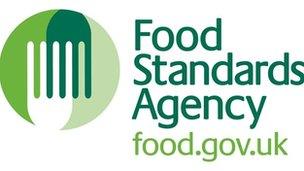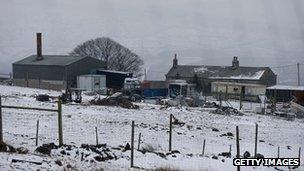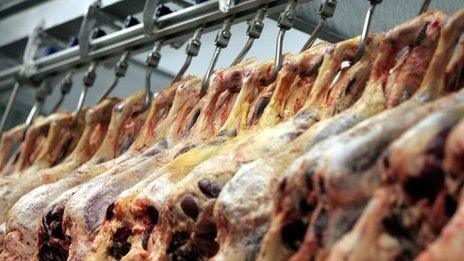What is the Food Standards Agency?
- Published

The scandal over the contamination of beef products with horsemeat and, in some cases pork, has thrown the Food Standards Agency into the headlines. But what is the FSA and what powers does it have?
The Food Standards Agency is an independent food safety watchdog set up in 2000 to protect the public's health and consumer interests in relation to food.
It was originally proposed in 1997, amid concerns about food poisoning, intensive farming methods and Bovine Spongiform Encephalopathy (BSE) or "mad cow disease".
Food policy experts wanted a new food agency responsible to the Secretary of State for Health, independent of the food industry, but at "arms-length" from ministers.
But food writer Joanna Blythman is highly critical of the FSA: "It was meant to be a watchdog defending consumer interests but it seems to have had an unduly cosy relationship with the food companies, bio-tech companies and large retailers ever since it was created."
She said it always appeared to treat campaign groups - such as those opposed to genetically modified (GM) foods - as a "lunatic fringe".
In 2010 the FSA had 2,000 employees and an annual budget of £135m but this was reduced as a result of the coalition government's spending cuts.
A shake-up by the new government led to the FSA handing over some of its responsibilities to government departments so it could focus solely on food safety policy and enforcement.
The Department of Health and the Welsh government took over nutrition policy in England and Wales but in Scotland and Northern Ireland the FSA remained in control.
The Department of Health and Department for Environment, Food and Rural Affairs (Defra) took over food labelling in England but the FSA remains in charge of labelling in Wales, Scotland and Northern Ireland.
The FSA's headquarters are in London but it has offices in York; Scotland, Wales and Northern Ireland.
It is accountable to Parliament through health ministers, and to the devolved administrations in Scotland, Wales and Northern Ireland for its activities within their areas.

The FSA led a raid on this slaughterhouse in Todmorden, West Yorkshire earlier this week
Improving eating habits
It has been credited with raising awareness of good eating habits and persuading food manufacturers to reduce their use of salt.
FSA campaigns have included pushing for stricter rules on TV advertising to children of junk foods and a mass recall of foods containing the dye Sudan I.
But it has been sorely tested by the horsemeat scandal, which broke last month.
Ms Blythman says: "That culture of backing up the food industry has continued and the FSA sees its role as reassuring consumers that food is safe and downplaying the risk."
She said when the horsemeat scandal broke most of the supermarkets retreated to a "bunker" and she said: "The FSA was fielding the flak that should have been directed at the supermarkets."
Ms Blythman said the FSA compared very unfavourably to the Food Standards Authority Ireland (FSAI), which she said was "more pro-active" and unearthed the horsemeat contamination in the first place.
Earlier this week, after raids at meat businesses in West Yorkshire and Wales, the FSA's director of operations Andrew Rhodes said: "I ordered an audit of all horse producing abattoirs in the UK after this issue first arose last month and I was shocked to uncover what appears to be a blatant misleading of consumers.
"The Food Standards Agency is a science and evidence-led organisation and we don't do things lightly. We have very good evidence to support the actions that we have taken."
Mr Rhodes said the FSA had a presence in every abattoir in the UK and tested 90,000 products a year, for bacteria such as listeria and salmonella.
But food writer Joanna Blythman said the FSA did not have its own laboratory and could not cope with the scandal.
In its corporate strategy the FSA has set itself six "outcomes" to deliver by 2015, external.
These include ensuring "foods produced or sold in the UK are safe to eat" and "that consumers have the information and understanding they need to make informed choices about where and what they eat".
- Published14 February 2013
